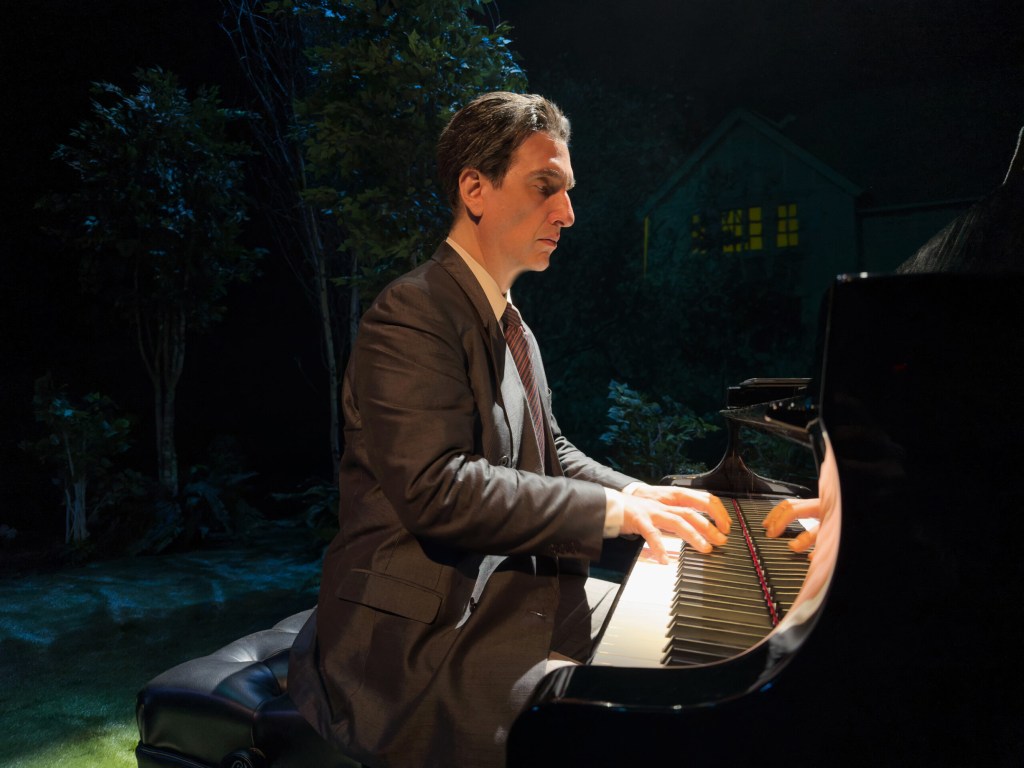
There’s a revealing insight that pulls back the curtain on Hershey Felder’s ambitious point of view.
The anecdote goes back nearly 45 years, when Felder was tackling Russian master Sergei Rachmaninoff’s other-worldly piano compositions in a young student’s program at Montreal’s McGill University. Looking back, was Felder overwhelmed by the mere scope of taking on Rachmaninoff as a 12-year-old?
“You know, I’m not sure I ever thought of it that way — I always thought of things as, ‘Gee, I’m 12, look at all those kids who are 11 doing it,” Felder said. “No matter who you are and what you do, there’s always somebody who does it faster, earlier, better, and you always have to rise to that challenge.”
These challenges come within a genre that Felder basically built himself. This week, he brings the12th chapter of his plays that combine acting with the music of the world’s most famed composers. “Rachmaninoff and the Tsar,” written and performed by Felder, directed by Trevor Hay, makes its Northern California debut at TheatreWorks Silicon Valley from Friday through Feb. 9. The story delves into the final years of Rachmaninoff’s life in Beverly Hills facing a terminal illness. It was then and there that the memory of an encounter with Russia’s Tsar Nicholas II and the Tsar’s daughter Anastasia haunts Rachmaninoff until his final breath. The show also features something of a rarity in a Felder production — another actor, the Tsar being portrayed by Jonathan Silvestri.
Felder has been producing his unique form of theatrical wizardry since his 1998 premiere of “George Gershwin Alone.” Years of experience later, the depths of Rachmaninoff’s nuanced brilliance and demanding musicianship is ready for Felder.
“As you get older, you get a sense of mortality, and sort of relax into what you need to do, how to do it economically and cleanly, and how not to force it upon the audience,” Felder said. “I think it takes time to get there naturally and to understand things about yourself, and understand that you don’t need to do so much to communicate something to the audience to tell the story relevantly.”
Another of Felder’s critically acclaimed creations focuses on Pyotr Ilyich Tchaikovsky, who heavily influenced Rachmaninoff’s initial entry into composition before he built his own unique sound. While Rachmaninoff may not have the crossover familiarity of Tchaikovsky, whose ballet “The Nutcracker” is everywhere during the holidays, Rachmaninoff’s most iconic piano concertos along with “Rhapsody on a Theme of Paganini” offer their own omnipresence.
“Rachmaninoff is one of these quintessential composers and a lot of pianists want to play his music,” said Pheaross Graham, a musicologist and lecturer at Stanford University. “For instance, it became almost standard fare within international competitions where you would play something of Rachmaninoff, like it was this Mount Everest thing. But probably, if you pause and maybe listen to some of these things, you’ll say, ‘I’ve heard that before.’ There’s often a kind of nostalgia evoked even if the name might not be familiar.”
Examining one of Rachmaninoff’s most famous compositions featured in the show, his second piano concerto, is a great example of how Russia influenced Rachmaninoff’s artistry. Graham recalled some of Rachmaninoff’s happiest memories, going to the Russian Orthodox Church and returning home to play the entire service for his grandmother, who would reward his mastery with a gold coin.
Mastery applies to Rachmaninoff. It is not a word Felder will ever apply to himself.
“I don’t tend to use the word mastered,” Felder said, “but if I’m connected to the thinking and can think through it clearly, even if it’s not 100 percent what I intended, it’s about control, about making a decision, and then executing.”
While the music will always be the star of the show, the reasons why the music was put into the world is what Felder finds equally fascinating.
“What I’ve been looking to do with these characters is to illuminate the context of what people do not know,” Felder said. “Even if you talk to musicians and pianists, they know a lot about the rhetoric, how to play something, and what is the accepted style, but in general, they don’t tend to study historical context.
“What I’m looking for, really, is to set these guys in context, so that when we hear the music, we understand where this music came from. I do believe that, in particular western music, as well as this kind of music, is born out of the context of composition. Hopefully, these pieces bring it alive a little bit.”
David John Chávez is chair of the American Theatre Critics Association and a two-time juror for the Pulitzer Prize for Drama (‘22-‘23); @davidjchavez.bsky.social
‘RACHMANINOFF AND THE TSAR’
Book by Hershey Felder, music by Sergei Rachmaninoff, presented by TheatreWorks Silicon Valley
When: Friday through Feb. 9
Where: Mountain View Center for the Performing Arts, 500 Castro St., Mountain View
Tickets: $35-$115; www.theatreworks.org

















































